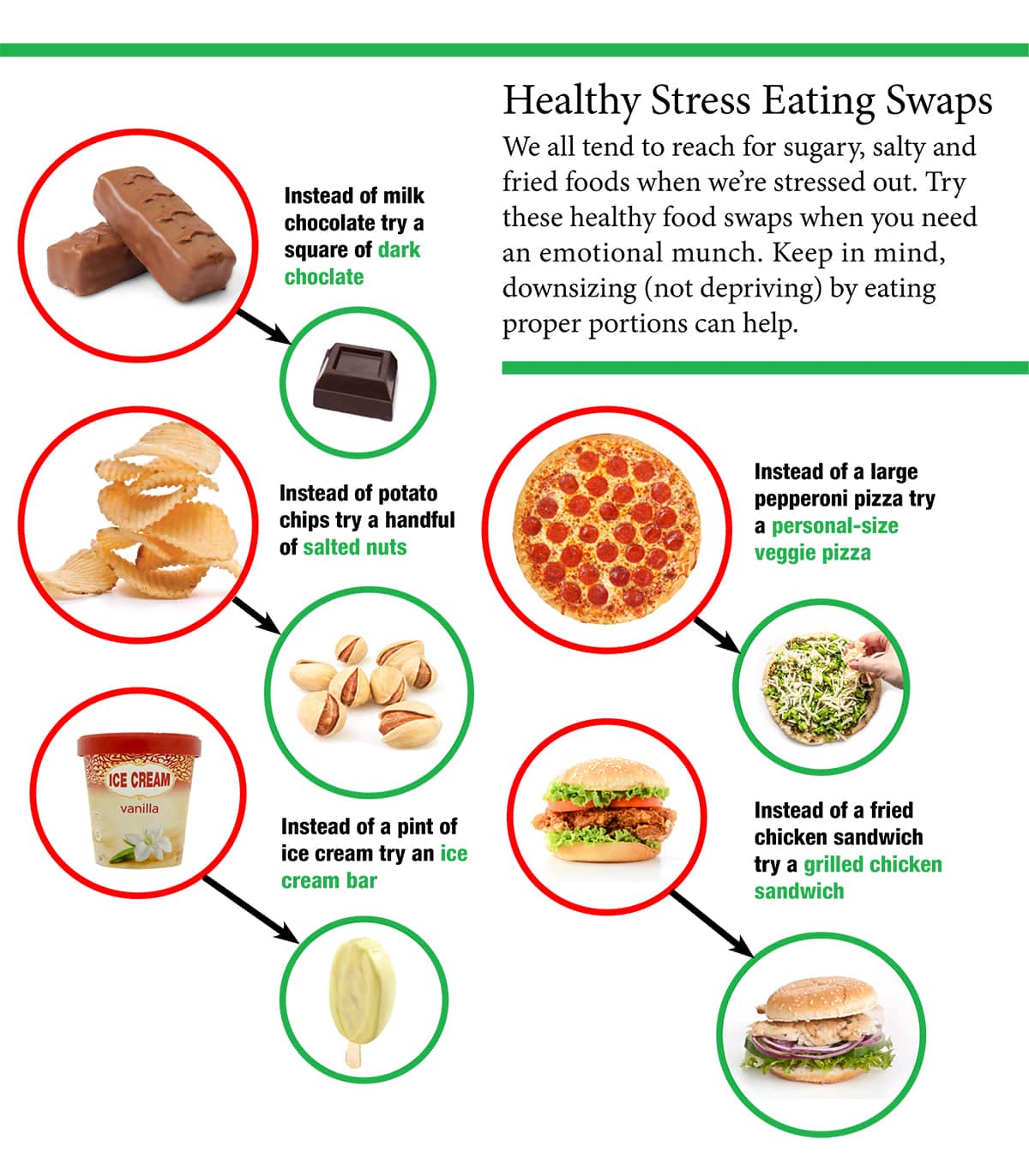Do you find yourself dipping into the potato chip bag or pint of ice cream more often when you’re stressed out? If so, you’re not alone — researchers confirm that stress can influence eating behaviors.
Three-quarters of adults (74%) say they have experienced at least one symptom of stress in the past month and about one-third of them (37%) reported eating too much or eating unhealthy food due to stress, according to the American Psychological Association’s 2018 Stress in America survey.
Stress poses a double whammy because when the body releases the stress hormone cortisol, hunger signals also increase in the body. Women, more so than men, report unhealthy eating behaviors due to stress.
The odds of overeating during stressful times are high. “The act of eating stops or slows the production of stress hormones, which makes stress eating a very reinforcing behavior,” explains Julie Friedman, PhD, national senior director, binge eating treatment and recovery, of the Eating Recovery Center, which has a location in Chicago.
Plus, cortisol decreases the brain’s sensitivity to leptin, a hormone that produces feelings of satiety. “This causes someone to have delayed or nonexistent satiety cues, leading to increased eating to feel full,” Friedman says.
At the same time, our stressed-out bodies are programmed to store more fat when we’re under stress than when we are relaxed. Elevated cortisol can cause accumulation of fat as well as metabolic syndrome.
What causes stress eating?
Stress is a normal part of life. It gets a bad rap, but stress can be motivating and positive in brief stints. Personality traits, emotional states and physiological responses all contribute to how we experience and moderate distress. However, when stress is chronic and prolonged, it can wreak havoc on your health — and on your diet.
“Stress eating is one way people cope with emotions and disconnect with what’s happening at the moment,” says Allison Shudnow, MS, RDN, LDN, CEDRD, a registered dietitian nutritionist and certified eating disorders specialist in Chicago.
Stress eating is a complex behavior with many underlying motivators. “Boredom, loneliness, isolation, fatigue and sleep deprivation can cause overeating,” Friedman says. “Plus, undereating throughout the day or calorie restriction combined with cumulative stress throughout the day can set someone up for grazing, picking, nibbling and/or binge eating at night.”
Sometimes people overeat when they’re alone at home or in the car. They may feel unsatisfied in relationships or with their body shape and weight — all of which can lead to the mentality of “screw it, it will never change,” which feeds mindless stress eating, Friedman says.
“It is okay to use food as a coping skill, but it should not be your only coping skill. It becomes maladaptive when stress eating is automatic or compulsive,” Shudnow explains.
How to combat stress eating
If you reach for food when the pressure is on, what can you do?
“If you’re not eating meals and snacks throughout the day and are physically hungry plus under a lot of stress, it’s hard to deal with both,” Shudnow says. “I work on putting time between the thought [of eating] and the behavior.”
In other words, if you want to reach for the box of cookies, take the time to not eat impulsively, but instead ask yourself if you are physically or emotionally hungry before eating the cookies. Shudnow recommends reaching for nonfood options — such as calling a friend, journaling, taking a shower or going for a walk — when the urge to emotionally eat hits.
Friedman recommends “decreasing physiological hyperarousal — or that wound-up feeling that can lead to stress eating for relief — by calming your body on purpose with deep breathing, progressive muscle relaxation, a cup of tea at night and decreasing scheduled activities for more downtime.”
Countering stress eating is complex. Each person’s circumstances and eating patterns vary greatly. Registered dietitian nutritionists or clinical psychologists who specialize in eating disorders can rule out serious health concerns, such as binge eating disorder, which is characterized by recurrent episodes of eating large quantities of food — often very quickly, to the point discomfort and with the feeling of loss of control.
To avoid stress eating, address hunger with a focus on consistent, balanced, nutrient-rich foods throughout the day to be sure that you’re fueling your body well. Of course, lifestyle comes into play when coping with stress, too. Get good quality sleep and keep food out of your wind-down routine to help counter stress as well as stress eating.


Vicki is a registered dietitian nutritionist, lifestyle nutrition expert, writer, culinary and media consultant and author of two books.












